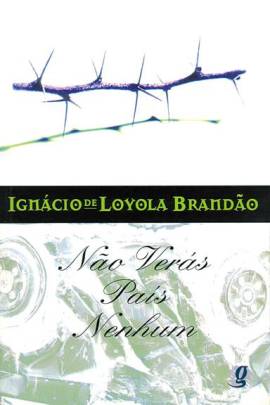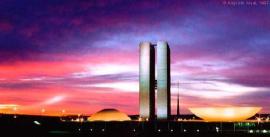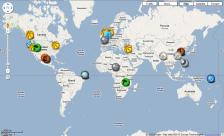In this ongoing series Jacques Barcia portrays his home country Brazil:
The country that could have been but maybe will.
By Jacques Barcia
Author Ian McDonald, when talking about his latest novel Brasyl, said the South American giant has always been the country of the future. That’s an epithet that every Brazilian knows by heart for it goes back to the post-war days and through the age of mass industrialization in the 1960s. An idea that became part of our national identity. The idea of being almost there, almost reaching the echelons of economic superpower, being just a few steps away from the First World. And getting closer. Forever getting closer. From the 60s to the 70s, then 80s, 90s and crossing to the 21st century, Brazil has been forever getting closer. But maybe now, Brazil’s fulfilling that prophecy. Or getting closer than ever.
Not surprisingly, this cultural aspect has everything to do with the way science fiction has presented itself in the country for the last 40 years and how, today, it may change.
 Brazilian SF has always been pessimistic. Worse yet, in many occasions it has been ironical to the very idea of future. The 70s and early 80s, the “age of lead”, as we call it, because of the military dictatorship on course, were marked by the publication of some classic dystopian novels, like “And Still the Earth” (originally Não Verás País Nenhum, or You`ll See no Country) by Ignacio de Loyola Brandão. A decade later, when cyberpunk finally arrived in Brazilian bookstores, it quickly grabbed readers and writers alike because, well, Brazil IS a cyberpunk country. And as the original punks would say, there’s no future.
Brazilian SF has always been pessimistic. Worse yet, in many occasions it has been ironical to the very idea of future. The 70s and early 80s, the “age of lead”, as we call it, because of the military dictatorship on course, were marked by the publication of some classic dystopian novels, like “And Still the Earth” (originally Não Verás País Nenhum, or You`ll See no Country) by Ignacio de Loyola Brandão. A decade later, when cyberpunk finally arrived in Brazilian bookstores, it quickly grabbed readers and writers alike because, well, Brazil IS a cyberpunk country. And as the original punks would say, there’s no future.
Crime rates are really high. Last year in my home city, a 3 million people metropolis, there were about 4,000 homicides. Literacy rates are very low and many live in extreme poverty. That lack of perspective, high crime rates, political corruption and years upon years of repression from the military dictatorship made Brazilian people (and Brazilian SF writers) believe that the country of the future would be even darker than it already was. Or that future was a very bad joke.
 But this same country of extreme conditions is hopefully getting better. There’s less extreme poverty, there’s more education, and general conditions are way better than ten years ago. And even though there are still extreme problems to be faced, there’s an interesting thing going on. Brazilians, especially the poorest, are in love with technology. By the numbers, there are more active cell phone lines than living Brazilians. Everybody has a cell phone. Everybody is on Orkut (you know, that social network from Google). Everyone has a flog, uploads videos to Youtube, shares MP3s, even the illiterate. And though the vast majority of people can’t afford a PC, Brazilians hold the world record for hours spent online per month per capita (24h07 in average).
But this same country of extreme conditions is hopefully getting better. There’s less extreme poverty, there’s more education, and general conditions are way better than ten years ago. And even though there are still extreme problems to be faced, there’s an interesting thing going on. Brazilians, especially the poorest, are in love with technology. By the numbers, there are more active cell phone lines than living Brazilians. Everybody has a cell phone. Everybody is on Orkut (you know, that social network from Google). Everyone has a flog, uploads videos to Youtube, shares MP3s, even the illiterate. And though the vast majority of people can’t afford a PC, Brazilians hold the world record for hours spent online per month per capita (24h07 in average).
Again, that has everything to do with SF literature. Brazil was cyberpunk and it’s becoming post-cyberpunk. If Brazil used to have marginal tech with a dirty, gritty and violent setting, now the country is techy, edgy, and hopeful. There are tons of examples of how things could get better with technology and how literature could represent those facts and hopes in fiction.
 For example, 3G networks are used in public web-based long-distance education programs. Computer games (like Civilization) are used in many schools to teach history, political science, administration, etc. Indigenous tribes use the web to preserve their cultural heritage. Almost-forgotten languages are available online, as well as ritual dances.
For example, 3G networks are used in public web-based long-distance education programs. Computer games (like Civilization) are used in many schools to teach history, political science, administration, etc. Indigenous tribes use the web to preserve their cultural heritage. Almost-forgotten languages are available online, as well as ritual dances.
Another example: Brazil has cars running 100% on alcohol since 1979. Total-flex cars are sold since 2003, a technology developed by Brazilian engineers. Brazilian alcohol comes from sugarcane which has lower impact than corn alcohol. The blend commonly called E25 (that is, 25% of alcohol and 75% gasoline) is the standard of Brazilian gasoline. Brazilian energy comes mostly from hydroelectric power plants and there are projects to build fields of wind turbines in the country’s Northeast.
 But unfortunately, Brazilian SF hasn’t realized those facts yet, mostly because established authors are reminiscent of a very depressing age. Maybe the current generation of SF writers, and certainly the next one, will feel more comfortable with imagining a better future. And dreaming with a brighter tomorrow they’ll certainly build a better one too.
But unfortunately, Brazilian SF hasn’t realized those facts yet, mostly because established authors are reminiscent of a very depressing age. Maybe the current generation of SF writers, and certainly the next one, will feel more comfortable with imagining a better future. And dreaming with a brighter tomorrow they’ll certainly build a better one too.

Jacques Barcia is a Brazilian science fiction and fantasy author living in Recife. He has sold microfictions to Outshine and Thaumatrope. He’s currently writing his first novel. He can be reached at jacquesbarcia@gmail.com.

































Excellent viewpoint. It’s part of what makes me skeptical of old generation writers – they reflects the past, without real evolution in their message.